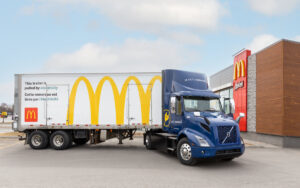The Volvo electric Class 8 truck, leased and operated by the fast-food chain’s distribution partner, will be used to run food and beverage deliveries to McDonald’s Canada restaurants in Montreal

The Volvo electric Class 8 tractor pilot, a first for McDonald’s Canada and distribution partner Martin Brower, is also a first for Volvo in Montreal. Photo: Volvo Trucks
The Volvo electric Class 8 truck, leased and operated by the fast-food chain’s distribution partner, will be used to run food and beverage deliveries to McDonald’s Canada restaurants in Montreal
Global fast-food chain giant McDonald’s Canada has announced it will be integrating a new Volvo VNR Electric Class 8 tractor trailer into its distribution fleet after its distribution partner, Martin Bower, decided to pilot the vehicle.
Martin Brower’s zero-emission tractor will be used to tow McDonald’s-branded trailers for food and beverage deliveries to Montreal-based McDonald’s locations — the first of two Volvo electric Class 8 tractor pilots involving the fast-food chain this year.
Martin Brower, which is U.S.-based and operates in 18 countries, is a logistics service provider specializing in food service. For the McDonald’s pilot, it is limiting deliveries by the electric truck to within a 150-kilometre range of its Montreal Distribution Centre, located in the Baie-D’Urfé area. Onsite charging infrastructure has been installed to support daily deliveries.
“Our goal is to deliver innovative and meaningful solutions to help restaurants and our business create a more sustainable, ethical, and responsible future — every day, all over the world,” said Julie Dell’Aniello, president, Martin Brower Canada in a press statement.
“By integrating the Volvo VNR Electric tractor into our fleet, we will gain valuable experience for future zero-tailpipe emission tractor deployments that will enable us to continue driving down Martin Brower’s greenhouse gas emissions so we can meet our sustainability targets.”
In the press release, Volvo Trucks North America’s managing director, Paul Kudla added: “We are excited to partner with our long-time customer Martin Brower to be the first to deploy a Volvo VNR Electric in Montreal in collaboration with McDonald’s Canada…We look forward to continued collaborations with both organizations as they begin their electromobility journey.”
Net-zero ambitions
McDonald’s Canada says it’s interested in seeing how the Volvo tractor will fit into its operations. McDonald’s has more than 1,400 locations across Canada. Montreal was chosen to test the tractor’s performance and reliability in both summer and winter conditions.
“This trial has the potential to influence a major shift in the way we approach supply chain distribution that will bring us closer to reaching McDonald’s net-zero goals,” said Jacques Mignault, McDonald’s Canada president and CEO, in a press release.
“Considering the potential impact the trial could have on our business and our global greenhouse gas emissions reduction commitments, this is an extremely significant moment for the company.”
McDonald’s is aligning with a global target of achieving net-zero emissions across all its operations by 2050.
Depending on the trial’s outcome, McDonald’s says it may consider advocating for more zero-emission vehicles in its supply chain.
In addition to the Montreal trial, McDonald’s confirmed plans to launch a second trial testing another Volvo VNR Electric Class 8 vehicle in Brampton, Ont. later this year.
Service dealership
The Martin Brower electric tractor will be serviced at the new Volvo Trucks-certified electric vehicle service centre, Camions Volvo Montreal. The service agreement for the Brampton truck was not announced.
In February, Volvo Trucks North America expanded its network of certified EV dealerships into Canada and chose Camions Volvo Montreal as well as Quebec-based Paré Centre du Camion as the first dealers to complete its required certification training program for its Class 8 battery-electric trucks.
“As a Volvo Trucks Certified EV Dealer, we are ready and able to support our customers with their greenhouse gas emission reduction transportation goals,” said Jean-Francois Bibeau, general manager for Camions Volvo Montreal.
“Electric is the future of transportation, and this is an exciting first step as we help to lead the transition to battery-electric tractors in Canada.”






